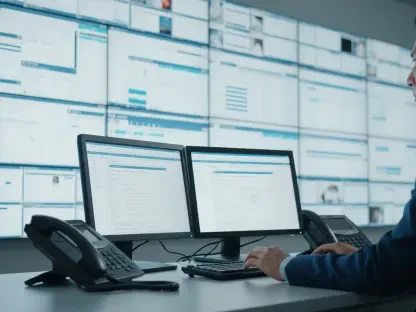The mechanical engineering students at the Viterbi School of Engineering experienced significant disruptions beginning on September 1, 2024, due to a software licensing problem with Siemens NX, a pivotal computer-aided design (CAD) program integral to their coursework and projects. As the licensing file required to access NX was found to be incompatible with the school’s licensing server, the resultant chaos forced coursework and academic projects to a standstill for nine days. Classes were abruptly canceled, and assignment deadlines were delayed, creating an atmosphere of frustration among both students and faculty. The immediate impact was felt through interrupted learning schedules, leading to heightened concerns over academic progress.
Heavy Reliance on Siemens NX
Siemens NX plays a critical role in many mechanical engineering courses at Viterbi School of Engineering, providing indispensable features for the design and testing of 3D models. This heavy reliance became starkly evident when the licensing issue emerged, illustrating the logistical challenges that ensued. The sudden unavailability of NX halted mechanical engineering classes and design projects, forcing both students and faculty to devise methods to cope with this unforeseen disruption. Department Chair Paul Ronney elucidated that the Viterbi IT department had planned to renew Siemens NX’s license at the start of the month. However, an alteration in the manner in which the file was generated resulted in incompatibility with the existing server setup, leading to this crisis. This scenario underscores the critical nature of anticipatory and seamless management of software renewals by IT departments.
The unplanned interruption had students and faculty scrambling for alternatives and facing an uncertain academic future. The cadence of academic life at Viterbi was upended, highlighting the essential role that reliable software access plays in maintaining the integrity of educational timelines. This incident serves as a stark reminder of the essential dependency on specific technological tools in modern engineering education and the broader implications of their failure.
Temporary Solutions and Continued Challenges
Initially, the Viterbi IT department attempted to address the issue by providing a temporary license to students and faculty, hoping to mitigate the disruption. However, this stopgap measure expired on September 17 before a permanent solution could be established, compelling the issuance of a second temporary license. While this allowed for a partial resumption of classes and projects, a stable environment was only achieved once a long-term license—valid until August 2025—was secured, providing some much-needed relief. Throughout this interim period, confusion and inefficiency were rampant, with classes canceled or delayed, leading to a disrupted learning schedule for students.
Despite these efforts, the period of uncertainty emphasized vulnerabilities in relying heavily on a single software solution without adequate contingency plans in place. This experience revealed the need for more robust planning and foresight, ensuring that such critical tools have redundancy and fail-safes to prevent similar future disruptions. The reactive approach to addressing the licensing problem illustrated the shortcomings in anticipating the complexities involved in software renewals and the need for a more proactive stance.
Impact on Students and Faculty
The disruption was acutely felt among students like Neysi Chegue, who recounted the significant frustration stemming from the cancellation of her CAD class and the subsequent delays in assignment submissions. Chegue underscored her reliance on structured learning environments and the necessity of timely assignments, especially given the rigorous demands of engineering courses. The interruptions not only impacted her immediate academic experience but also had broader ramifications for her career planning, particularly in relation to enhancing her resume for future internship applications.
Such disruptions were not solely academic but also emotional, as students contended with uncertainties surrounding their academic journey and potential career opportunities. Faculty members, on their part, faced the formidable challenge of maintaining course schedules and project timelines, further exacerbating the strain on Viterbi’s engineering community. The multifaceted impact bore down on both faculty and students, reinforcing the critical nature of dependable software access in supporting the educational continuum.
Student Organizations and Project Delays
The licensing issue also wreaked havoc on student-led organizations, including the USC Recumbent Vehicle Design Team and the USC AeroDesign Team. Sophia Li, program chair for the Recumbent Vehicle Design Team, shared that her team had to switch to a different CAD software due to the inability to access the temporary NX licenses. This transition posed significant challenges in training and onboarding new members, disrupting their workflows. Consequently, project timelines were delayed, and team efficiency suffered as members had to adapt to unfamiliar software.
Jake Hatakeyama, structures lead for the USC AeroDesign Team, echoed similar sentiments, noting persistent access issues even after securing a long-term license. Although the team could access NX’s modeling features, the simulation features remained inaccessible, forcing them to learn and utilize alternative simulation software. This adaptation period caused further delays in their project timeline, impeding progress and adding unnecessary complexity to their efforts.
By disrupting established workflows and necessitating abrupt shifts to alternative software solutions, the issue underscored the systemic weaknesses in software dependence and contingency planning. Student organizations, pivotal to experiential learning and hands-on projects, found their operations significantly strained, revealing the far-reaching impacts of such disruptions.
Proactive Engagement with Viterbi IT
In response to the ongoing challenges, student teams, including the AeroDesign Team, engaged in continuous communication with the Viterbi IT department to seek updates and possible solutions. Hatakeyama pointed out that valuable information regarding the progress of resolving these issues primarily came from proactive student involvement with the IT department. This interaction emphasized the importance of transparent communication channels between IT departments and users, particularly in academic settings where timely software access is paramount to educational success.
This ongoing dialog highlighted the necessity of fostering collaborative relationships between IT departments and the academic community. Proactive engagement enabled a better understanding of user needs and facilitated more effective troubleshooting and solutions, reinforcing the importance of stakeholder involvement in managing complex technical issues.
Broader Implications and Lessons Learned
Starting on September 1, 2024, mechanical engineering students at the Viterbi School of Engineering encountered major disruptions due to a critical issue with Siemens NX, a key computer-aided design (CAD) software essential for their classes and projects. The software licensing file needed to use NX turned out to be incompatible with the school’s licensing server, causing a chaotic situation that halted coursework and academic projects for nine days. This unexpected technical glitch led to the abrupt cancellation of classes and the postponement of assignment deadlines. The interruption not only disrupted their learning schedules but also heightened tensions among both students and faculty, creating a sense of frustration and concern over the direction of their academic progress. The severity of the disruption underscored the dependence on technology for modern education and highlighted the vulnerability of academic institutions to technical failures that could, within a short period, significantly impact students’ educational journeys and timelines.









